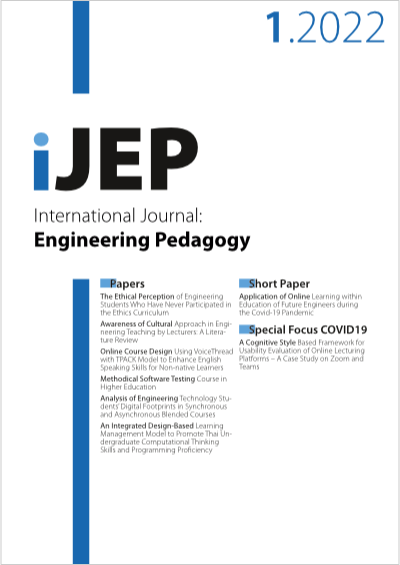Online Course Design Using VoiceThread with TPACK Model to Enhance English Speaking Skills for Non-native Learners
DOI:
https://doi.org/10.3991/ijep.v12i1.24407Keywords:
speaking learning, non-native learners, TPACK model, learners’ progress, satisfaction, perceptionsAbstract
Abstract –Learning English as a foreign language (EFL) and computer technology are two fundamental skills for learners majoring computer science and control engineering not only for the use in academic fields but also for the means of communication worldwide. Among language skills, speaking is a core output element that all learners wish to achieve. This research looked into TPACK (Technological Pedagogical and Content Knowledge) model with an aim to de-sign an online English speaking course for non-English majored learners using VoiceThread as an instrument. Twelve Japanese students participated in the study over 12 weeks. The researcher used internal-service speaking criteria and a self-designed course satisfaction questionnaire based on TPACK model dimensions to collect quantitative data analyzed by R-studio software. Qualitative data were collected and analyzed by content analysis from interviews. The results of this study were discussed in terms of the learners’ progress as well as their satisfaction and the perceptions about using VoiceThread via Zoom and Google Classroom online learning platforms. The TPACK model suggested an effective teaching approach for teachers that can enhance non-native learners’ English speaking performance
Downloads
Published
2022-02-10
How to Cite
Nguyen, T. T. T., & Takashi, Y. (2022). Online Course Design Using VoiceThread with TPACK Model to Enhance English Speaking Skills for Non-native Learners. International Journal of Engineering Pedagogy (iJEP), 12(1), pp. 33–50. https://doi.org/10.3991/ijep.v12i1.24407
Issue
Section
Papers
License
Copyright (c) 2021 Thuy Thi Thanh Nguyen, Yukawa Takashi

This work is licensed under a Creative Commons Attribution 4.0 International License.


